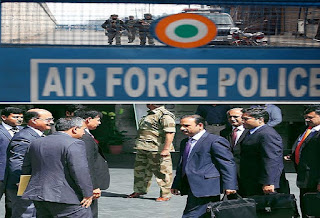Who should
be held responsible for the death of five innocent civilians in Kashmir Valley
last week? The submission by a minor girl before a chief judicial magistrate
that she was not molested by a soldier exposes a sinister campaign to discredit
security forces. Kashmir was on the boil all through last week after a rumour
spread that an Indian soldier had tried to molest the minor girl. Angry mobs
were out on the streets, shouting slogans, pelting stones at security forces and
police. Who instigated them to create a law and order problem in the Valley?
As
it appears, there was a deliberate attempt to vitiate the atmosphere. And those
who did it knew very well how the security forces would react. And the security
forces fell into their trap by opening fire on a rowdy crowd which led to the death
of five people who perhaps were not party to the conspiracy. Among those who died was a young boy who
wanted to represent Indian cricket team one day. It just took one rumour and
five innocent lives were snuffed out leaving behind their families to mourn their
loss forever.
It is a
well known fact that there are some forces which do not want the presence of
Indian army in Kashmir. From time to time, there have been vicious campaigns
against the army over its alleged excesses on “innocents” and human rights violations in Kashmir
Valley. The same forces have become active once again to discredit security forces
which have been battling against all odds to maintain law and order situation
in the state.
But
normalcy is anathema to a few in Kashmir who are working against the interests
of their own brethren. As long as their personal interests are served, they
don’t mind sacrificing the lives of others. Their personal interests are well
served as long as Kashmir remains tense. Kashmiris should ask themselves
whether they have benefited by frequent “hartal” calls given by separatist
leaders. Why is that innocent people get killed and instigators remain confined
in safe environs?
Who will
explain the latest killings? It is very easy to put the blame on security personnel
who were forced to open fire. But who provokes them? They are often abused and
ridiculed. A recent video which went viral speaks volumes about how security
personnel have to put up with humiliation. The video of a soldier, who was chased,
thrashed and humiliated by a bunch of young boys, showed his helplessness. How does one expect a normal human being to
react when his honour is at stake? And security personnel are humans too.
The
political leadership of the state rushes to New Delhi every time any such
incident happens. Every time, the oft-repeated arguments against Armed Forces
(Special Powers) Acts (AFSPA) are put forward before the federal government. No
state favours special powers which give soldiers virtual immunity from
prosecution. But can security forces fight insurgency with their hands tied
down? In fact, Indian army has on occasions taken punitive action against its
soldiers whenever they were found to have violated norms. But human rights
activists and critics say the prosecution process is slow and not all cases are
probed.
Here in
lies an important question. If security forces can be accused of human rights
violations then so are violent protesters. If security personnel come under attacks, what
are they supposed to do? Should they become sitting ducks? Does the
constitution not give them right to defend themselves if their lives are
threatened? This is a question which needs to be debated at length. The AFSPA, which
covers large parts of northeastern India and Kashmir, gives security forces
powers to search, enter houses and shoot-on-sight. Human rights activists say
the soldiers misuse the law and commit abuses, whereas the army says it needs
the law to tackle insurgency. Both sides have contrarian view points. Special
powers come with some responsibilities as well. The army will do well to get
such unsavoury incidents probed by an independent commission.
All said
and done, the casualties could have been avoided had the situation been handled
tactfully. Why rumour mongers were allowed to have field day in the first place?
The local government is equally responsible for not acting fast and allow the
situation to simmer. A video first released by the army wherein the girl denied
molestation by a soldier was trashed. The protesters claimed that the girl gave
the statement under duress. Among those who doubted the veracity of the army
video were myriad factions of the Hurriyat Conference which brought the Valley on
a standstill by giving “hartal” calls for days together. Should the Hurriyat not be held responsible
for letting the situation deteriorate? It is disheartening to see the innocent
youth falling victims to separatists’ agenda and losing their precious lives.

